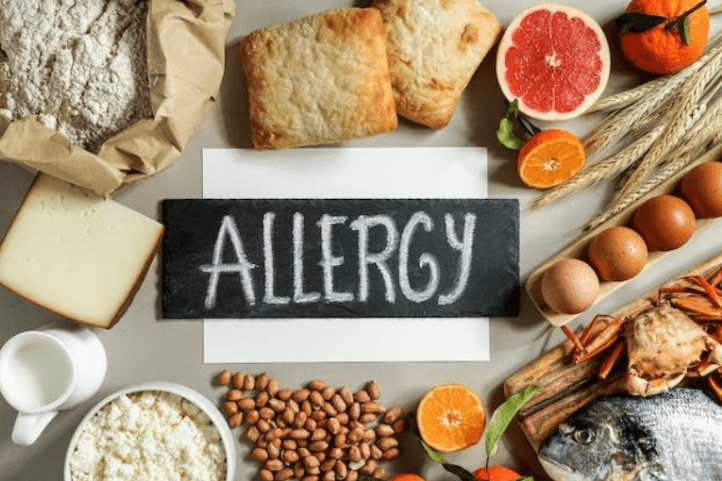Adriana Mazolla HBA, RHN
Food allergies have become increasingly prevalent in recent years. While conventional medicine focuses on managing symptoms and avoiding allergenic foods, a holistic health approach seeks to understand the root causes of food allergies and address them through a comprehensive and personalized way. In this article, we will explore the concept of food allergies from a natural medicine standpoint, shedding light on the underlying factors and offering insights into managing and preventing allergic reactions.
To begin, it is essential to understand what a food allergy is. A food allergy is an abnormal immune response triggered by the ingestion of certain foods. When an individual with a food allergy consumes an allergenic food, their immune system mistakenly identifies it as harmful and releases chemicals, such as histamine, to protect the body. This immune response can vary from mild to severe and lead to a wide range of symptoms, including hives, swelling, digestive issues, respiratory problems, and even life-threatening anaphylaxis. Common food allergens include peanuts, tree nuts, shellfish, dairy, eggs, soy, and wheat.
From a holistic standpoint, food allergies are seen as a manifestation of an imbalanced immune system and overall health. Rather than solely focusing on avoiding allergenic foods, it is important to identify and address the underlying causes of food allergies. These causes can vary from person to person and may include factors such as gut health, nutrient deficiencies, environmental toxins, stress, and genetic predispositions. Understanding these underlying causes can help in developing effective natural treatment strategies.
One crucial aspect in managing food allergies is supporting gut health. The gut plays a significant role in the immune system, and an imbalanced gut microbiome can contribute to the development of allergies. Probiotics, prebiotics, and fermented foods can help restore the balance of beneficial bacteria in the gut, strengthening the immune system and reducing the risk of allergic reactions. The term ‘leaky gut’ also holds a strong connection when speaking about food allergies. Leaky gut, or increased intestinal permeability, occurs when the gut wall becomes damaged and begins to allow undigested food particles and toxins to enter the bloodstream, triggering an immune response. This immune response can lead to the development of food allergies, as the body recognizes these undigested food particles as threats. A poor diet, smoking, alcohol use, and frequent use of some medications are all contributors to leaky gut. Everything covered in this article to help alleviate food allergies will also help protect the integrity of the gut lining, but more specific protocols can be created to address an existing leaky gut condition.
Another key consideration is identifying and addressing nutrient deficiencies. Nutrients like vitamin C, vitamin D, zinc, and omega-3 fatty acids play vital roles in immune function and can help modulate the immune response. Anti-inflammatory foods and supplements such as turmeric, ginger, garlic, and (again) omega-3 fatty acids can help alleviate allergic reactions by reducing inflammation in the body.
In addition to gut health and nutrient deficiencies, stress is another factor that can impact the immune system and exacerbate food allergies. Chronic stress can weaken the immune response and increase inflammation in the body, making allergic reactions more severe. Both environmental stress, such as pesticides, heavy metals, and other pollutants, and mental stress can disrupt the immune system and increase the risk of developing allergies. Hence the importance of consuming organic, whole foods whenever possible and minimizing exposure to environmental toxins. For mental stress, techniques such as meditation, deep breathing exercises, yoga, exercise, supplements, and adequate sleep can help manage stress levels and support the body's natural healing processes.
Additionally, an elimination diet and a few potent herbal remedies can help identify and prevent food allergies. An elimination diet involves removing potential allergenic foods from the diet for a period of time and then reintroducing them one by one to identify specific triggers. This method helps in pinpointing the problematic foods and allows for personalized dietary modifications. The addition of certain supplements and herbs, such as nettle, quercetin, and butterbur, have natural antihistamine properties and can provide relief from allergy symptoms.
In conclusion, a holistic understanding of food allergies involves looking beyond the avoidance of allergenic foods and addressing the underlying factors that contribute to allergic reactions. By focusing on gut health, nutrient deficiencies, environmental toxins, and stress management, one can strengthen the immune system and reduce the severity of allergic responses. Everyone is unique and so are their needs, but these are a few general factors and suggestions to keep in mind when trying to gain a deeper understand of food allergies



 Monthly Specials
Monthly Specials








